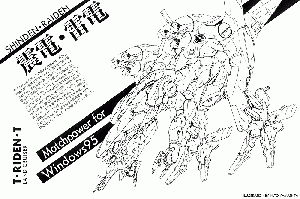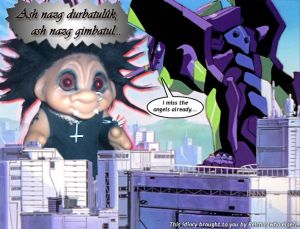The Geektionary T-Z: Difference between revisions
The wayneiac (talk | contribs) (Added categories) |
Sachiel 13 (talk | contribs) |
||
| Line 33: | Line 33: | ||
==Transition Guide== | ==Transition Guide== | ||
[[Image:Fuyu-Rei.jpg|thumb|right|One of many "Transition Guides"]] | [[Image:Fuyu-Rei.jpg|thumb|right|One of many "Transition Guides"]] | ||
A term Mr. Tines appropriated from [http://en.wikipedia.org/wiki/Technological_singularity (Technological) Singularity] geekdom as a shorthand for the [[The Geektionary N-S#Rei-tachi|Rei-tachi]] in EoE who go around and make people go | A term Mr. Tines appropriated from [http://en.wikipedia.org/wiki/Technological_singularity (Technological) Singularity] geekdom as a shorthand for the [[The Geektionary N-S#Rei-tachi|Rei-tachi]] in EoE who go around and make people go “splat" (also commonly known as being "tanged"). This term is useful even if one doesn't know what the bloody hell the Singularity is, but, for the curious, the [http://www.aleph.se/Trans/Words/s.html#SINGULARITY simplest definition] seems to be, “The postulated point or short period in our future when our self-guided evolutionary development accelerates enormously so that nothing beyond that time can reliably be conceived.” (PHEW!) Having established that, a transition guide is defined at [http://www.acceleratingfuture.com/lexicon/lexicon5.htm Accelerating Future] as, “the bridge between modern-day humanity and the other side of a Singularity”, i.e. an agent of whatever Transcendent Power is born of the Singularity whose purpose is to ease the passage from pre- to post-Singular state. (I hope that makes more sense to you than me!) Mr. Tines has assessed the Singularity to be “a fair statement of the goal of the HIP”. An interesting comparison… I'm guessing that most of the Singularity geeks have been putting their faith in Ghost in the Shell-style scientific advances instead of alien technology, occult rituals, and the shameless misuse of Pointless Religious Symbolism, though Mr. Tines comments, “You can use alien transcendent technology if you have it — but can you ever trust it? See also Vinge's A Fire upon the Deep.” | ||
==T-RIDEN-T Land Cruiser== | ==T-RIDEN-T Land Cruiser== | ||
Revision as of 06:21, 9 February 2008
Note: You will notice that The Geektionary occasionally uses first person references in violation of this site's standards and practices. This is the exception that tests the rule. Don't anyone else do this.
More Pages:
T
-tachi
See Rei-tachi.
Tang

The brand name of a popular orange-flavored drink. By some strange coincidence, it also happens to be a popular synonym for LCL — you know, being an amber-colored liquid that smells like blood and all.
Tangify
To become Tang. (See: Tang.) n. Tangification
Teddy
See Seele Dudes.
Theatrical Program Books
Three handsome, nameless A4-sized booklets that were published in association with the initial theatrical runs of the NGE movies (DEATH & REBIRTH and END OF EVANGELION). Instead of detailing them here, you will be lazily directed to EvaOtaku's site.
Transration
Sometimes "TransRation" (for emphasis). An Engrish version of the word "translation", pronounced the same except for the consonant substitution, and often used my me to refer to my own Japanese → English work due to its occasional dodginess. "Shadows of beeeeer!"
Transition Guide

A term Mr. Tines appropriated from (Technological) Singularity geekdom as a shorthand for the Rei-tachi in EoE who go around and make people go “splat" (also commonly known as being "tanged"). This term is useful even if one doesn't know what the bloody hell the Singularity is, but, for the curious, the simplest definition seems to be, “The postulated point or short period in our future when our self-guided evolutionary development accelerates enormously so that nothing beyond that time can reliably be conceived.” (PHEW!) Having established that, a transition guide is defined at Accelerating Future as, “the bridge between modern-day humanity and the other side of a Singularity”, i.e. an agent of whatever Transcendent Power is born of the Singularity whose purpose is to ease the passage from pre- to post-Singular state. (I hope that makes more sense to you than me!) Mr. Tines has assessed the Singularity to be “a fair statement of the goal of the HIP”. An interesting comparison… I'm guessing that most of the Singularity geeks have been putting their faith in Ghost in the Shell-style scientific advances instead of alien technology, occult rituals, and the shameless misuse of Pointless Religious Symbolism, though Mr. Tines comments, “You can use alien transcendent technology if you have it — but can you ever trust it? See also Vinge's A Fire upon the Deep.”
T-RIDEN-T Land Cruiser

The appellation situation behind the giant robots introduced in the video game Girlfriend of Steel is poorly understood. AFAIK, they are never actually named in the game itself, although the section of Sore o nasumono dedicated to Yamashita's concept art has "T-RIDEN-T LAND CRUISER" printed in a corner top throughout. In the comment accompanying the finished design, Yamashita says:

Since the creation process was completely finished, I was finally given notification of the official names: "Shinden" and "Raiden". Because I had wanted a class designation in the original name, the "mu" of "Gamu" (the mecha's temp name) was added onto "Raiden" as "T-RIDEN-T Class Land Cruiser".
Typical Japanese wordplay in action: The second kanji of Gamu (臥矛), pronounced mu or hoko, means "halberd" or "pike", and "sansa no hoko" (三叉の矛, or "three-pronged halberd") means "trident". Additionally, the English word "trident" converts into Japanese syllables as to-ra-i-den-to. Notice anything? "Raiden" is sandwiched between two occurrences of the syllable to: To-raiden-to. Or, when you put it back into English spelling with Caps Lock on, T-RIDEN-T. Cute, eh?


Of the three mecha pilots in GOS, Musashi's sexy, vaguely dinosaur-like 'bot is the only one that gets any real screen time in the game; Keita's only appears for one cut, having done a giant face plant off a waterfall; and Mana's doesn't appear at all. The latter problem appears to be corrected in the PS2 version of GOS, wherein both (A) a new mech designed by Yamashita debuts, and (B) Mana is seen in the act of piloting; so, unless further info contradicts this extrapolation, we'll just assume the mech is Mana's. The Eva Store refers to it as "Raiden", which sort of makes one wonder just what the hell "Raiden", "Shinden", and "T-RIDEN-T" specifically designate. Worst comes to worst, we can just call all of them Toyota Land Cruisers.
Troll

These well-known creatures of legend and infamy infest every corner of the collective Internets. Evangelion fora are no exception, of course, and we survived the onslaughts of many-a-troll during the grand ol' days of ANF. NGE trolls thrive on raiding the preexisting community and, rather than take the time to amiably ease themselves into NGE geek society and subject themselves to the usual rites of passage (most famously, the “Naked Eva Tolerance Test”), they proceed to attack the well-established theories in as smart-ass and inflammatory a manner as possible — or otherwise pollute the forum atmosphere with their rotten personalities. Not only are they usually impaired by Fuzzy Logic, they selectively ignore any evidence or argument that punches holes in their ideas, making them impossible to reason with and pleasant debate futile. A less severe subspecies of troll actually possess a SURFEIT of logic, which enables them to mathematically “prove” that others' ideas are wrong while “proving” that their own ideas are correct. No NGE trolls yet encountered have proven themselves as truly grand as our two favorites, the immor(t)al Fuzzy Chickens (Fuzzy Logic's namesake) and RahOtaku, two names that will surely turn up during our adventures in Commentary Land.
U-Z
UBF
Archaic. Über Bitch Fight. The bitch fight that's so big, it's über — i.e., the battle between Kyoko-sama and the harpies.
ve/ver/vis
Native speakers of English are undoubtedly familiar with the limitations of the available pronouns. Among the choices for third person singular, we have “he” for males, “she” for females, and “it” for everything else. Obviously, things become problematic when one needs to refer to entities that are either (A) of indeterminate gender (sometimes by their own intent), (B) unspecified gender (requiring awkward phrasing like "he or she"/"him or her"/etc. or laborious rewording), or (C) possess no biological sex at all. (There are other headache-inducing cases as well, but none of relevance here.) Yeah, there's always “it”, but “it” makes no distinction between abstract concepts (hope), locations (porn shop), inanimate objects (Uzi), and living entities (hamster), which kind of, well, sucks.
Mr. Tines presented a solution for our (well, particularly my) woes, which was the Gender Neutral Pronoun ve/ver/vis. Although this sounds kind of funny if one attempts to use it in everyday speech, it is infinitely useful in writing — a quick and easy solution for the (B) problem, and quite handy for the (A) aspect of the Internet, as the physical characteristics of individuals are generally unavailable for reference, and thus using “he” or “she” can be a bit of a gamble if you don't know any better. In sci-fi like Evangelion, it has additional benefits, considering the various “non-human” entities within, for whom many people are not willing to commit to one gender or another. This GNP actually does have a slight following at ANF. (For more info on the sex/gender issue, see Gender.)
To demonstrate how this pronoun is used, I provide the following example: “Vis name is Pat. Is ve a boy or a girl? Maybe we should ask ver.”
Vladimir (or Vlad)
See Seele Dudes.
Yui-sama
Possibly inspired by lingering memories of Fushigi Yuugi, I originally began using this to differentiate between Yui Ikari the Mortal (pre-2004) and Yui Ikari the Divine (post-2004) — due to my insane fangirl assertion that Yui, although a great character no matter what, is only TRULY great when in the body of an Evangelion. So, when referring specifically to Yui the Mortal, I used plain old “Yui”, but, when referring to the purple-clad goddess that Yui became (= EVA-01), “Yui-sama” was employed instead. Through repeated bombardment, this eventually began to catch on (to my perverse delight…). In contemporary usage, -sama is no longer neccessary (although still employed as desired), and "Yui" is, to the acquainted, understood to refer to her both pre- and post-Ascension.
Zerogouki
See -gouki.
Entries penned (or simply assembled) by Reichu unless otherwise noted. Harsh statements about certain individuals are only expressions of geeky displeasure with their NGE-related flubs, not assaults on their actual persons. There's an important distinction.
